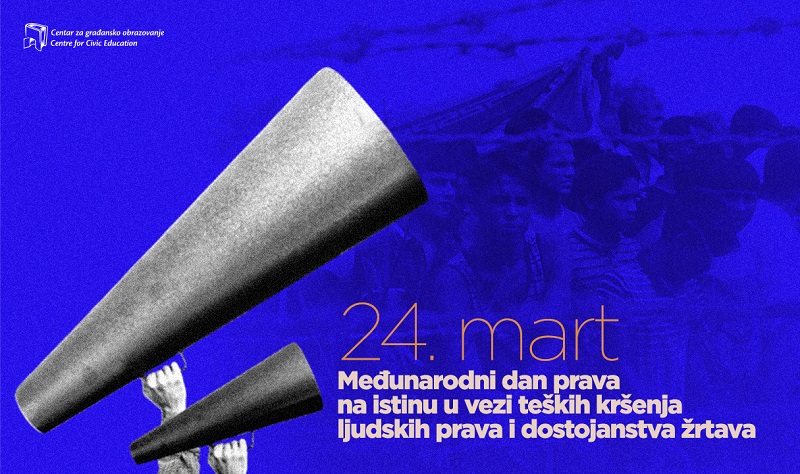Centre for Civic Education (CCE), on the occasion of 24 March – the International Day for the Right to the Truth concerning Gross Human Rights Violations and for the Dignity of Victims, points out the significance of responsible and systematic approach by decision-makers, judicial authorities and educational institutions towards civilizational obligation of determining facts about the war crimes committed during the 90s, track record in processing the war crimes and discovering destinies of the disappeared.
Breakthrough in this area is not only one of the conditions on our path towards the EU, but also a precondition towards constructing sustainable multi-ethnic harmony, trust and tolerance in Montenegro.
War crimes leave far-reaching consequences that cannot be addressed adequately with only declarative statements without concrete actions. Apart of processing perpetrators and determining the responsibility, it is necessary to systematically work on demystification, condemnation and suppression of ideas and actions which have led to war crimes, but also to prolongation and futility of final justice. The right to truth must not be diminished through marginalization of activists, trivialization of remembrance culture and “editing” of history books. At the end, we have to confront with all societal tendencies in Montenegro which seek to prevent our facing with controversial issues from the past. Only in that manner we can create strong civic society, resistant to local and regional nationalistic flares which exist even today.
In Montenegro, the discourse about the significance of confronting the past lives within the civil society and in part of its state institutions. However, it is obvious there is a need for wider and more inclusive public dialogue, more functional existing mechanisms and stronger institutional capacities in this area.
The latest CCE’s research indicate that citizens know about wars and war crimes committed during the 90s, but after quarter of century they are still not ready to talk specifically about those events. This indicates the inadequacies of educational system, lack of dialogue and insufficient confrontation with the controversial issues from our recent history.
War crimes must never be forgotten, regardless of who were victims and perpetrator. Equally, we must not let the legacies of our unsettled past to burden modern Montenegro after 25 years since the conflicts ended. The victims, their families and the families of the disappeared have equal right to truth. Their unsettled destinies stand as warning to our incompetence and irresponsibility.
The United Nations General Assembly proclaimed 24 March as the International Day for the Right to the Truth concerning Gross Human Rights Violations and for the Dignity of Victims. The date was chosen because on 24 March 1980, Archbishop Oscar Arnulfo Romero of El Salvador, famous human rights defender, was assassinated, after denouncing violations of human rights of the most marginalised population, and defending principles of protection of right to life, promoting human dignity and strong opposing to all forms of violence. The purpose of commemorating this day is to promote the significance of right to truth and justice.
Miloš Vukanović, Advisor in the CCE

